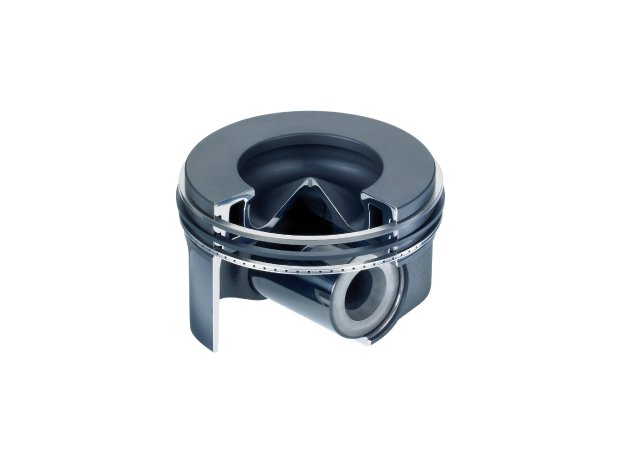International automobile manufacturers are currently examining the automotive steel pistons in durability tests and one premium-segment OEM has recently placed an order for an initial series development - production is planned to begin in 2014. The piston is to be placed in a four-cylinder engine with a cylinder pressure of more than 200 bar and a specific performance of more than 100 kilowatts per litre.
Even though aluminum is basically lighter than steel: the refined steel piston is meanwhile as light as its aluminum counterpart and has a shorter compression height as well as a longer connecting rod. This results in reduced side forces. Comprehensive tests have also shown that friction has been reduced so that a 2 - 3% lower fuel consumption can be achieved thanks to the design with reduced piston skirt surfaces, optimized assembly clearance and piston profile.
The new steel piston design can moreover be installed in engines with reduced cylinder block height. An optimized piston cooling configuration and an adaptation of the combustion parameters compensate for the relatively lower heat conduction of steel compared to aluminium pistons and the resultantly higher combustion chamber surface temperatures. The large enclosed cooling channel is positioned directly at the temperature-critical bowl rim and cools it optimally. The favourable temperature level that thereby arises in the piston ring zone reduces both carbonization of the ring groove and also abrasion on the piston ring groove and piston ring over the life of the piston.
KS Kolbenschmidt's patented steel piston design consists of a one-piece forged piston with a reshaped and fully supported ring land, which enables very low groove deformations. The pistons will also be able to achieve higher target values with respect to blow-by and oil consumption in the future.
A further main focus of the development activities lies in the optimization of the noise behaviour of steel pistons - especially in combination with aluminum crankcases. The lower thermal expansion of the steel piston - which favourably affects friction reduction - has a negative effect with respect to the so-called Noise Vibration Harshness (NVH), at hot running conditions. Solutions to this issue are currently being worked out in comprehensive tests and in close collaboration among KS Kolbenschmidt engineers and customers.


